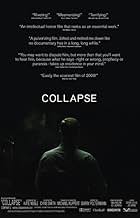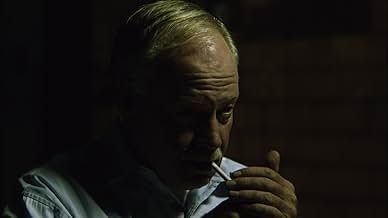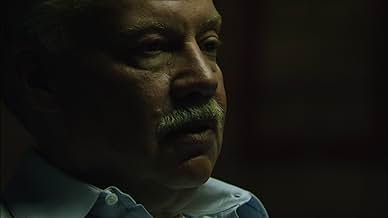A documentary on Michael Ruppert, a police officer turned independent reporter who predicted the current financial crisis in his self-published newsletter, From the Wilderness.A documentary on Michael Ruppert, a police officer turned independent reporter who predicted the current financial crisis in his self-published newsletter, From the Wilderness.A documentary on Michael Ruppert, a police officer turned independent reporter who predicted the current financial crisis in his self-published newsletter, From the Wilderness.
- Director
- Writer
- Star
- Director
- Writer
- All cast & crew
- Production, box office & more at IMDbPro
Featured reviews
I would like to have had more info on a lot of his quotes but I guess that would likely take an 80 minute documentary into like 3 or 4 hours (which I wouldn't have minded). I might just buy some if his books to take a look to see how much more in depth he gets on most of the topics he covers in this documentary.
For me, watching this, it was like it's about time. What I mean by that is finally someone who doesn't come across as a street corner preacher or a bona fide nut. This guy is just talking about real issues that matter, or at least they should matter.
But the real element that grabs you is Smith's subject. Ruppert will be seen by some as a prophet and by others as a nutcase but he has a magnetism on screen that is undeniable. This ex-cop is well-spoken it is very obvious that he has given conferences and presentations as he begins to explain his theories.
The main point Ruppert is trying to get across is undeniable. Our planet has finite resources which will not be able to sustain our current way of life indefinitely. But Ruppert's actual discourse will never be confused with a green activist as he veers constantly into subjects such as peak oil, politicians and banks. Where Ruppert is more questionable is when he mixes opinions with facts.
Ruppert repeats that he is not a conspiracy theorist yet often acts like ones. He constantly cites people, studies and historic events that favors his point of views and ignores the rest. These are old techniques that have been used by countless gurus, theorists and leaders and Ruppert does it very effectively.
This mix of truth and speculation works because the part that is truth is monumentally percussive: We as a species will not be able to live this way forever.
Ruppert posits that the system is crashing down fast but you don't have to believe this to enjoy this documentary. He interprets all sorts of world events as symptoms and yet again, you can take it or leave it. He claims he has been shot at and that US presidents have taken a personal interest in him without offering any evidence and you can discard this. He makes a compelling argument that alternative energies we are exploring are not sustainable/viable in their actual form but you can choose to disagree. He lashes at the deficiencies of globalization and you could ignore that too.
What you can't ignore is that change will have to happen. Smith seems confident that the audience will make up their minds about Ruppert and his theories. You do not have to share Ruppert's quasi-apocalyptic vision of the future to have a great time watching this.
Despite the praise, Collapse is not without a few flaws. I wished more time had been devoted to questioning Ruppert's wilder claims. Shot at? When? Where? Who? I also thought Ruppert's angle was too focused on the US and would have loved to hear his opinion on China and a few other things.
But overall, this is a nice documentary with an air of political thriller to it. Whether it is academic or objective, is left for each viewer to decide.
Ruppert hits us right away with peak oil, arguing that though actual supplies have been kept hidden by governments, even Saudi Arabia, which has more than anybody, is starting to run out, and we're clearly now on the down slope of the bell curve. He says no substitute will really work, because all the alternative energy sources require too much energy themselves to produce. The planet's infrastructure is going to shut down; it's just a matter of time. Parallel to this is economic collapse, and he predicted the present crisis -- but expected it a year or so earlier. (Mighn't he be jumping the gun a little on this larger collapse?)
Ruppert is a survivalist, warning us all to live locally. He compares the fates of North Korea vs. Cuba when they lost the Soviet oil lifeline: Korea, a monolithic dictatorship, took a terrible hit. So did Cuba, but people pulled together there, raised crops locally in every available spot of land, and soldiered through so well they're now eating better than ever. He would have us take the same route: raise our own food, and horde gold -- the actual metal, not paper certificates -- and organic seeds, which in a world stripped of supply will become currency.
Ruppert is a smoker, and Smith doesn't hesitate to show every time he lights up. This looks like a marathon, and the interview -- with challenging, skeptical questions off camera from the director from time to time, not that this overconfident autodidact type ever wavers -- is so intense Ruppert actually breaks down and weeps more than once at the hopelessness of it all.
Smith's film is effective, and if it leaves you in some doubt whether the man is a kook or a visionary maybe that's part of the sense of radical unease you may justifiably feel walking out of the theater. Though Ruppert is made to seem both knowing and deranged, his talk is smart and well-informed. Clearly fossil fuels are finite. It all depends on transportation; it all depends on electricity. Without oil, these shut down. If seven gallons of oil go into the making of every tire, how are we going to make a whole new set of cars that run on something else? What about plastics? What about overpopulation? Ethanol is a sick joke, clean coal a lie. Even wind and solar power won't be possible because we won't have the energy to set up the power sources to utilize them. Global warming is just the planet's way of crying "uncle." When oil runs out, we'd better be ready before the infrastructures all collapse, or it's going to be hard going. We've got to downsize. It won't be easy.
It's rare that anybody thinks things through this far. No wonder the tears come. They come when he thinks of Barack Obama, a smart, good, honest man, he says, but someone so locked into the systems that we can't look to him for help. And that's very, very sad. The world's last, best hope is an illusion. (These are just a few of Ruppert's points: into these 82 minutes he condenses the fruits of decades of independent thought and study.)
Smith asks Ruppert what spiritual beliefs sustain him and he simply quotes the Bible: "money is the root of all evil." He asserts that we must find ways to live without growth and profit as guiding motives. The pervasive pursuit of money is the great, tragic human flaw.
This is an intensified and distilled Michael Ruppert, very effective but a bit misleading: he has other facets. In another setting glimpsed in the film but available in full on YouTube you can see Ruppert in a suit and tie giving a rambling, self-indulgent slide lecture full of many of the same interesting facts he likes to cite, including the government's reliance on drug trading, but very different in feeling and veering (though he denies this elsewhere) into 9/11 Truth territory. Collapse ends with captions noting that Ruppert, whose only friend seems to be his faithful dog, is having trouble paying his rent and may be evicted from his Culver City place.
But again on YouTube you find him being interviewed recently in Oregon, where he has moved, looking and sounding sunny and grounded and socially connected. If he's a kook, he has lots of friends, some of them quite respectable, and "Peak Oil" is a rallying cry for many. The YouTube videos show Ruppert isn't always the intense nut case Smith gives us. He suffers, he thinks too much, but he can have fun; he can talk without a smoke. He feels Ashland is a place among many (including much of South America) where sustainability will be possible when the paradigm shift comes. The end of he world won't be the end of the world. This may not totally convince you, but it will scare you. Rupert protests in Smith's movie that he deals in conspiracy facts, not conspiracy theories. He just may be right.
All of his concerns are true, and some are even worse than he stated, but the very worst problem of all didn't even get a mention from him....that of global overpopulation that is the root cause of all the symptoms of our existence troubles that he did state.
To simplify......if the world's population was 20% of what it is now, the maximum sustainable figure, all of Ruppert's concerns for human existence would not be crucial for thousands more years when real solutions to the problems he stated might be available. But, we cry about the symptoms and don't care one bit about the cause so we continue to overpopulate all countries with uncontrolled new births, and are continually overburdened with resultant and mostly unsolvable problems as a result. Air, water, oil, food, and every single other problem of today that Ruppert stated has been caused by overpopulation, but still we cry only about symptoms, as Ruppert does, instead of the root cause of all our global problems....too many people being born with no controls on it and, what is much worse, no gov't or societal thought even being given to it.
As a result of that typical human stupidity and shortsightedness we are done, people, it is just a matter of time, and not that much time either, as your own young grandchildren will suffer badly as a result. But, still you don't care, so nothing is ever done about it. We don't deserve any more time on earth if we don't even care enough about protecting our continued existence by working on the cause of all of our problems.
It seems I need to continue my comment based on IMDb policy of ten lines. That doesn't impress me as necessary, but I see the decision isn't mine. It's a great film, go and watch it. Anyway, hopefully this is enough to satisfy the rules. Why the needless wordiness IMDb? I liked the film and the participant, that isn't enough said? I'll bet many reviews never get posted based on the ambiguous ten lines rule.
Did you know
- TriviaAccording to director, Chris Smith, they initially agreed the primary subject was supposed to be the CIA's connections to drug smuggling within the Iran-Contra affair, specifically Ruppert's collaboration with Pulitzer Prize-winning reporter Gary Webb's mid-1990's investigative series, "Dark Alliance." But Ruppert didn't want to talk about the CIA. Instead, he wanted to talk about peak oil, and its critical implications for the future.
- Quotes
Michael Ruppert: It's kind of sad because we as a species have become so disconnected from the Earth. We don't have any real contact with the Earth. We don't have any sense of its functions, its feeling, its seasons, its timings.
- ConnectionsReferenced in Film Junk Podcast: Episode 235: TIFF Report, Part 1 (2009)
- SoundtracksCollapse
Performed by Karli Larsen, Didier Leplae, Joe Wong
- How long is Collapse?Powered by Alexa
Details
Box office
- Gross US & Canada
- $46,964
- Opening weekend US & Canada
- $7,800
- Nov 8, 2009
- Gross worldwide
- $46,964
- Runtime
- 1h 22m(82 min)
- Color



















